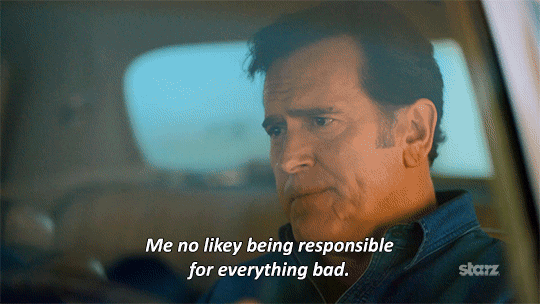If you're given all the power in the universe - would you use it responsibily? What is responsible?
Picture this, a world where artificial intelligence runs rampant, unchecked and uncontrollable. Responsible AI becomes the beacon of sanity in this chaos, a concept that demands accountability, transparency, and fairness in the creation and deployment of AI systems. It's the last defense against the digital apocalypse.
What is Responsible AIResponsible AI is essential because without it, technology risks reinforcing existing inequalities and biases. Failing to consider societal impact can lead to discrimination and ethical concerns, undermining trust in technological advancements. In short, neglecting responsibility in AI development harms society and erodes confidence in innovation.

(Ash vs Evil Dead 2018) We might not like 'responsibility' but you can't just ignore it?
ExamplesIn the worst-case scenarios, irresponsible AI could perpetuate systemic discrimination, amplifying existing social inequalities. For instance, in hiring processes, biased algorithms might favor certain demographics, entrenching disparities and hindering diversity. This not only undermines meritocracy but also fosters an unjust cycle of exclusion.
If left unchecked, AI systems with insufficient safeguards could pose severe threats to privacy. Imagine a world where personal data is exploited on an unprecedented scale, leading to mass surveillance and manipulation. In such a dystopian reality, individuals could become mere data points, susceptible to exploitation and control, eroding the very fabric of democratic values and personal freedoms. Responsible AI practices are essential to avoid sliding down this slippery slope.
BackgroundThe background history around responsible AI is a tale of evolving awareness and adaptation to the ethical implications of artificial intelligence. In the early stages of AI development, the focus was predominantly on technological advancements and capabilities, often neglecting the potential societal consequences. This oversight led to the emergence of AI systems with biases, contributing to issues of discrimination and fairness. The realization that these technologies could perpetuate and even exacerbate existing social inequalities sparked the need for a paradigm shift towards responsible AI.
As awareness grew, so did the acknowledgment that AI developers and organizations bear a significant responsibility for the impact of their creations. The historical context reveals a shift from a narrow focus on technical prowess to a broader understanding that responsible AI involves ethical considerations, user empowerment, and societal well-being. This transition has been marked by the development of ethical frameworks, guidelines, and the incorporation of diverse perspectives in AI teams. However, the critical debate lies in the pace of this evolution; some argue that the tech industry has been slow to adapt, with profit motives often overshadowing ethical concerns. Striking a balance between innovation and responsibility remains a persistent challenge, requiring constant scrutiny and adaptation in the dynamic landscape of AI development.
Trust vs ResponsibleThe eternal struggle between trust and responsibility in the treacherous landscape of AI. Imagine a world where blind trust in AI reigns supreme - a dystopian nightmare where we relinquish control to algorithms, assuming they'll act in our best interest. In this techno-utopia, the eerie silence of unquestioning trust shrouds the dangers lurking beneath the surface.
Trust in AI, when unbridled, transforms into a malevolent force. Imagine a scenario where autonomous systems, trusted implicitly, make life-altering decisions without accountability. This blind faith becomes a pact with the digital devil, as algorithms, driven by unforeseen biases or malicious intent, steer society into chaos. The illusion of security crumbles, revealing a realm where trust becomes a sinister puppet master, manipulating the strings of our lives.
On the flip side, responsibility emerges as a beacon of reason in this technological haunted house. Without it, the Pandora's box of AI malfeasance creaks open. Responsible AI, the sentinel guarding against unchecked power, demands transparency, fairness, and accountability. Ignoring this responsibility plunges us into a descent where algorithms, devoid of ethical constraints, wreak havoc on privacy, exacerbate societal divides, and perpetuate biases, casting long and chilling shadows over the future.

The key to motivation is Trust (Simpon/Homer) - but what happens when we lose trust?
The spine-chilling truth is that blind trust in AI is the path to a digital abyss, where algorithms, devoid of a moral compass, shape a world we may not recognize. Responsible AI, in contrast, is the crucible where ethical choices are forged, guarding against the insidious consequences of unchecked technological advancements. The debate between trust and responsibility is a battle for the soul of our digital future, where the wrong choice may lead us into a nightmarish realm of our own creation. Choose wisely, for the consequences may be far scarier than the shadows we can currently fathom.
Components of Responsible AIThese key components cover all the important aspects of responsible AI by addressing various dimensions crucial for ethical and fair AI development:
• 1. Ethical Frameworks: Establish clear ethical guidelines to guide AI development and use.
• 2. Transparency: Ensure transparency in AI algorithms and decision-making processes to build trust.
• 3. Fairness: Strive for fairness in AI systems, addressing biases and avoiding discrimination.
• 4. Privacy Protection: Implement robust measures to protect user privacy and sensitive information.
• 5. Accountability: Hold developers, organizations, and AI systems accountable for their actions and impact.
• 6. Inclusive Development: Foster diversity in AI development teams to prevent biases and enhance perspective.
• 7. Continuous Monitoring: Regularly assess and monitor AI systems to identify and rectify potential issues.
• 8. User Empowerment: Provide users with control over their data and insights into how AI systems affect them.
• 9. Regulatory Compliance: Adhere to and contribute to evolving legal and regulatory frameworks governing AI.
• 10. Public Engagement: Involve the public in discussions about AI development, seeking input and addressing concerns.

Process steps means even if you're lost and not very good at being 'reponsible' you'll still be able to develop a robust and comprehensive framework for your AI.
Process StepsThe sequence of the process steps is designed to create a comprehensive and robust framework for responsible AI development. The steps are in this order:
• Step 1. Define Purpose and Values: Clearly outline the purpose of the AI system and the values it should uphold.
• Step 2. Data Collection and Bias Assessment: Scrutinize data sources for bias and ensure diverse and representative datasets.
• Step 3. Ethical Guidelines: Develop and adhere to a set of ethical guidelines that align with societal norms and values.
• Step 4. Transparent Algorithms: Design algorithms that are transparent and understandable, allowing users to comprehend decision-making processes.
• Step 5. Privacy by Design: Integrate privacy protection measures into the AI system from the initial design stages.
• Step 6. Fairness Testing: Regularly test AI systems for fairness, addressing biases that may emerge during development or deployment.
• Step 7. User Education: Educate users about how AI systems work, their impact, and provide options for user control.
• Step 8. Continuous Monitoring and Evaluation: Implement ongoing monitoring to detect and address issues as they arise, ensuring the system's responsible behavior over time.
• Step 9. Regular Audits: Conduct regular audits to assess the ethical and responsible performance of the AI system.
• Step 10. Feedback Mechanisms: Establish channels for gathering feedback from users and the wider community to improve and refine the AI system.
|